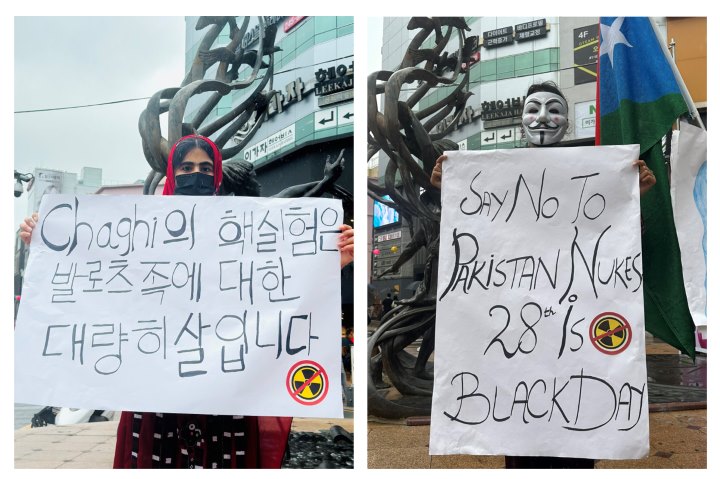Even as a tumultuous and unstable Pakistan celebrated the silver jubilee of its nuclear tests on 28 May 1998 as the Youm-e-Takbeer, the Baloch diaspora observed the day as black day by holding demonstrations across the world.
By conducting the nuclear tests in Chagai in the Ras Koh Hills of Balochistan, Pakistan became the first Muslim nation to acquire a nuclear stockpile. Two days later on 30 May 1998, it held the second nuclear test, called Chagai-II in the Kharan Desert of Balochistan.
The Baloch community has been protesting ever since over the blasts that damaged their ecology and the health of their people. Over the weekend, the community protested in the UK, the Netherlands, Germany and even South Korea.
Pakistan had kept its nuclear programme a secret even from the provincial government of Balochistan, many members of which came to know about the tests from the media.
#London:
Baloch National Monument (@BNMovement_ ) is protesting against nuclear test in #Balochistan#NukeAftermathInBalochistan— Bahot باہوٹ (@Bahot_Baluch) May 28, 2023
Baloch sources say that the uranium for Chagai-I was also sourced from the Baloch region of Dera Ghazi Khan. Many Baloch politicians expressed concerns about radiation contamination, environmental damage, and long-term consequences to health.
They allege that Pakistan did not put any assessment or mitigation measures in place to reduce the fall-out from nuclear tests. Baloch human rights activists say that successive governments in Pakistan have not paid heed to health risks from radiation and have not provided support programmes for the local community that continues to suffer from disabilities.
Baloch National Movement (BNM – Netherlands) protest.
Pakistan is one of the dangerous countries in terms of Human Rights Violations.
Pakistani ISI & Army is abducting Baloch political activists, Baloch writers, doctors & Human rights activists across Balochistan. pic.twitter.com/NRC1AaxP20
— Fazila Baloch🌺☀️ (@IFazilaBaloch) June 27, 2021
In London, the Free Baloch Movement (FBM) protested in front of 10 Downing Street, the Prime Minister’s official residence, to highlight the human rights “violations in occupied Balochistan” by the Pakistani army. FBM members also spoke about the Pakistani nuclear test that damaged health and environment in their region.
In the Netherlands it was the Baloch National Movement (BNM) that organised the protest at the Dam Square – the main tourist attraction in the Dutch capital. The protestors said that Pakistan is one of the most dangerous countries in human rights abuse because of the illegal abduction of Baloch political activists, writers, doctors and women by the spy agencies and the army.
My freind @ahamoodbaluch is speaking at Göttingen Protest againt Pakistani Nuclear weapons in Balochistan@bnm_deutschland @BNMovement_#NukeAftermathInBalochistan pic.twitter.com/vstXmE6pxS
— Asghar Ali Baloch (@ImAsgharBaloch) May 28, 2023
The protest at Göttingen in Germany was organised against the Pakistani nuclear weapons, many of which have been stored in various military installations in Balochistan.
Baloch media organisation, Radio Zrumbesh posted photographs of a BNM protest from as far as South Korea.
بی این ایم زرباری کوریا ءِ ماں بوسان ءَ پاکستان ءِ جوھری چکاسانی بگیری ءَ زھرشانیhttps://t.co/Y5DNv5HM5q pic.twitter.com/JExwgYxVQb
— ریڈیو زْرمبش بلوچی (@rzbalochizbc) May 28, 2023
The Baloch say that the tests were conducted without the consent of locals and many in the population currently suffer health problems like cancer, skin ailments and respiratory diseases. Other issues caused by the nuclear tests were the damage to biodiversity and contamination of soil and water.
28 May 1998 marks the day when #Balochistan was engulfed in the inferno of nuclear weapons testing. These tests were conducted without the consent of locals and a substantial section of the population is to date immersed in the aftermath of nuclear destruction. pic.twitter.com/lFiGsCIbOJ
— Baloch People’s Congress (@BPCongress) May 28, 2023
The Baloch, who have been fighting for independence from Pakistan say that they want the right to transform their country to a nuclear-free zone and want international agencies to hold Pakistan accountable for their loss. The activists also want China to stay away from mining their resources and also stop constructing the Gwadar Port in Balochistan.




















